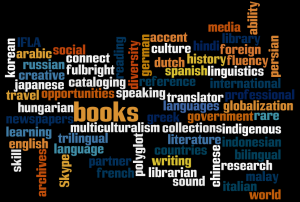by Raymond Pun, reference and research services librarian in New York University Shanghai
peviously published 7/14/2014
Learn a New Language For Your Library Career!
One of the most important and useful skill to have is knowledge of another foreign language. Libraries today are interested in having someone who has multilingual skills and experiences working in a diverse environment.
Whether you are interested in being a cataloger, rare books librarian, branch librarian or subject specialist, these positions and many others may require or prefer a candidate who has another language skill. Knowing another language introduces you to a whole new world filled with different cultural ideas and values.
Today, there are many opportunities to learn another language. This post will cover some ways to learn another language for your library profession.
What Languages to Study?
- You can choose the most popular language in your community: if your library serves a large Vietnamese community, it might be a challenge to learn Vietnamese but it can become a major advantage for you to connect with your library community. You can practice your language skills with locals as well.
- If you love challenges, you can learn the most critically needed or hardest languages according to the United Nations – foreign languages such as Arabic, Russian and Chinese are difficult but you can really brand yourself for an appropriate library position if you know those languages.
- Focus on your goals: if you want to be a European Studies or Middle Eastern Studies librarian, you will need to know another language and sometimes two other ones. Being a subject or area studies specialist may require more than one foreign language because you are collecting materials in their languages and also you may need to provide research support in various languages. If you want remain competitive in the job market, knowing another language can also introduce you to positions in technical services, collection development or rare books. It all depends on your plans.
Resources to Support your Language Study
- One of the most popular learning language initiatives is Skyping with people from different countries. You can find a friend or partner to exchange languages with you – you can teach English while they teach you their native language. You can also write emails or send letters in the language or keep a blog of your writing. Skype also have groups where you can find or partner with other people learning languages as well.
- Read newspapers, comic books, popular magazines and fiction in the language you want to learn. Popular fiction works well because you can use the English version to help your reading comprehension. Your local library should have a collection of these works. If not, you can search for resources easily online such as Google Books, Hathi Trust, Digital Public Library of America, etc.
- You can also learn languages through social media or language sites such as YouTube, BBC Languages, Wikipedia articles, Duolingo, and your local library’s databases like Mango Languages, etc.
- Watching T.V., listening to the radio or music online, these are also ways to get you thinking and hearing your language passively. It’s also fun to read transcriptions or captions at the same time because it may help you recognize the spell and pronunciation.
- If you have time and money, you can take a language class in your local community college, or continuing education course, or if you work for a school, you can get free tuition as well. Some graduate programs also offer classes in “reading levels” meaning they will teach you to read the language but not to speak it, it is useful for technical services and collection development purposes.
- Online tools and dictionaries: there are online flashcards you can make to support your study such as cram.com; or set “daily email” of new vocabulary such as Spanish Word a Day. You can even use apps to study your targeted language now. Learn language forum is my favorite site to learn the latest resources or tips in learning a difficult language.
- The most expensive approach: travel! Go to the country and explore, use the language, and practice it! But most of all have fun learning it. It’s not just for a job but also for your life.
 Bio: Raymond Pun is currently a reference and research services librarian in New York University Shanghai where he provides research support to faculty and students. Previously he worked as a librarian in the New York Public Library where he offered research and instructional services, and coordinated outreach and programming services. In 2012, the Library Journal nominated him as a Mover and Shaker and this year, he is one of the ALA Emerging Leaders. He has presented and published widely on various topics such as Chinese cultural history, international librarianship, digital literacy, etc. He holds an M.L.S and M.A in East Asian Studies and you can find him on Linkedin and discover his travel blog!
Bio: Raymond Pun is currently a reference and research services librarian in New York University Shanghai where he provides research support to faculty and students. Previously he worked as a librarian in the New York Public Library where he offered research and instructional services, and coordinated outreach and programming services. In 2012, the Library Journal nominated him as a Mover and Shaker and this year, he is one of the ALA Emerging Leaders. He has presented and published widely on various topics such as Chinese cultural history, international librarianship, digital literacy, etc. He holds an M.L.S and M.A in East Asian Studies and you can find him on Linkedin and discover his travel blog!
Find INALJ’s interview with Raymond Pun here!

10 comments for “Learn a New Language For Your Library Career!”